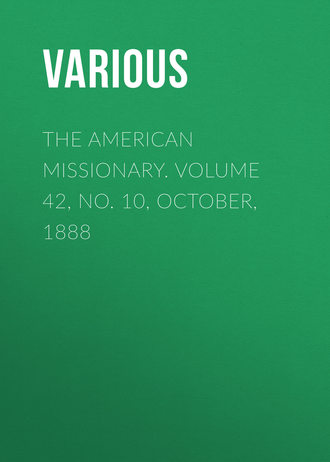 полная версия
полная версияThe American Missionary. Volume 42, No. 10, October, 1888
A great many families are gathered in by getting their children interested. A parent sends his little ones to our school and says: "I never had no chance to git learnin', but I wants my children to have it."
There, after all this rambling, I have reached the one idea which I believe ought to stick in the mind of every A.M.A. worker and every A.M.A. supporter—the children! If we can only teach them, save them, the African in America and in Africa is saved. It seems to me this is the solution of the problem. The longer one labors among the colored people and learns them and their surroundings, the more difficult seems the solution of the negro problem. Tourists in the South and people at a distance are very prolific in suggestions as to the best methods for elevating the negro. Why! visitors who have spent hardly twenty-four hours in a Southern city can write home marvellous letters as to the wonderful progress of the colored race, and prophesy a speedy settlement of the matter of negro education and race prejudice. It is a fact, however, that the longer one stays here the more puzzled he grows about these matters. An old A.M.A. worker said to me, "The first year of your work you will think you understand the colored people pretty well; the second year you won't know quite so much; the third year still less, and so on until by the tenth year you will think you don't know anything about them." But we all come to one conclusion, that all the trouble arising from race prejudice will pass away as the negro rises. When he is able to intelligently exercise all his rights, then the white man will have to acknowledge them. This result is in the distance, and while due attention is given to the older ones, yet the destiny of the colored race is wrapt up in the rising generation. They are terribly endangered, but they must be saved if the race is saved. A new generation, who knew nothing of slavery but much of the dangers of freedom, are taking hold upon manhood. They must be taught to read, to think, to work, to save and to love goodness for its own sake. If all this can be brought about I believe the Negro question will be settled. This must be done. I trust that not all of the 1,500 who have lately signified a willingness to enter the mission field will suppose that all of the ignorant and needy millions are on the other side of the globe. We hear a good deal just now about patriotism. Now, how can one better prove his patriotism than by giving his money or service to save his country from ignorance and degradation? It will pay you back in dollars and cents, to say nothing of the reward of learning that "it is more blessed to give than to receive."
INTEMPERANCE
The few lines below indicate the quality and flavor of the papers read by the graduating class at Atlanta University.
One of the great causes of intemperance in our land is that lack of self-respect which the present state of society induces among the poor and laborious. Just as long as wealth is the object of worship and the measure of men's importance, and is regarded as the badge of distinction, just so long will there be a tendency toward self-abasement and self-abandonment among those whose lot gives them no chance to acquire it.
Such naturally feel as if the great good of life were denied them. They feel themselves neglected. Their condition cuts them off from communion with educated and refined people. They think they have little or no stake in the general weal of life. They feel as though they have no character to lose, consequently intemperance takes possession of them.
This evil of intemperence is said by some to be the greatest of all evils. It is the cause of the ruin of some of our fathers and brothers, and I am sorry to say it ruins some of the mothers. When we, the temperance girls and boys, ask them to leave off their habit of drinking, they tell us that it does them good. When cold it makes them warm, when warm it makes them cold. When troubled, it cheers them. When weak, it strengthens them. It is certainly killing them by degrees.
STUDENT'S LETTER
THE BLUE-JACKET TEACHER—FIRST SCHOOL EXPERIENCE
From youth I was impressed that the "Yankee" was the terror of the world, capable of literally swallowing a small fellow, so it was with great difficulty that Judge M.J. S–, a Southern white man, induced me, in 1873, to enter Burrell Academy, then an A.M.A. school located in Selma, Alabama, and taught by some of those "blue jacket" beings whose names did not always begin with "blessed." The principal having sent me to Grade 2, I followed a little girl to the door of that room. She passed in while I stood at the door and thought thus, "Shall I go in here when one of those awful "blues" is there?" Half doubting, half fearing, trembling throughout, I slipped shyly inside the first school-house I ever entered, and lo! to my greatest surprise there sat a woman who was anything but "blue," whose face was as white and fair as any ever seen, whose hair was slightly golden, whose voice seemed more sweet, mellow and musical than the softest flute note; she was one whom all praised and loved. The only blue about her was her eyes, which marked her pure Saxon lineage.
When I felt sure that no monster would suddenly spring from those queer walls of white and black, I silently exclaimed, "Why, that's a white woman!"
In March, 1873, she began teaching me the alphabet, when I was thirteen years old. I had no mother and no home or friend, other than Judge S–, in whose family I served.
In 1874 he left the city, leaving me homeless. I vainly sought work but was turned away with "too small."
Pinched and pressed by hunger and want, I was despairing when that angel-like teacher, one of the purest and best of women, came to my rescue, and thenceforth with her own hands and earnings continued to help supply all my needs—material and spiritual. She taught me the alphabet of school, of life and of heaven; she influenced me to pray, and in answer to our prayers I was converted and joined the church in 1875.
In May, 1879, finishing the course, I graduated from Grammar Department A, of Burrell Academy, and began teaching in Cato, Miss., in 1880. In the autumn of this year, I entered the Normal and College Preparatory Departments of Talladega College, and graduated in May, 1884.
Returning to Preston, Ga., I resumed my school work, whence I was called to a position in Burrell Academy under Prof. Edwin C. Silsby, Principal. Upon the resignation of the above named gentleman, in 1885, I was finally chosen principal of that school. This position I still hold, striving to perform in the most faithful, earnest and satisfactory manner the work of him that sent me.
The first money earned by me as teacher, went toward the purchase of the home now owned and occupied by us. My good friend, who labors to-day in Beaufort, N.C., having helped me through college and seen me launch upon life's tide, seemed to say, "My boy, do not drift, but steer straight for heaven's port, and do unto others as I have done unto you." For me, her prayers still ascend, unto me, her wise counsel still comes, and upon me, her benedictions still rest.
In conclusion I say God bless you, A.M.A. for sending such a laborer into the field, for if there is, or shall be, in me anything of manhood, worth or useful service to my country, my people and my God, the credit is due to her.
ALEXANDER A. PETERS.
THE INDIANS
MR. MOODY'S MISSIONARY MEETINGS
REV. MR. SHELTON'S ADDRESSMr. Moody's Missionary Meetings have been a marvel in their conception, in their remarkably large audiences and in the still more remarkably able and interesting class of speakers—some of them from distant mission fields. They show how broad and many-sided is Mr. Moody's mind and heart.
At the meeting held August 8th, Rev. C.W. Shelton, the Financial Secretary for Indian Missions of the American Missionary Association, was invited to address the meeting. We condense from the Springfield Union an outline of Mr. Shelton's stirring address, and its effect upon Mr. Moody and others in attendance, with the practical results.
The most stirring address of the morning was delivered by Rev. Chas. W. Shelton of New York City, on the Indian problem. He stated the problem with simplicity and dignity, but when he got worked into his theme, he became eloquent in his description of the position of the Indian people and their strong desire to receive the gospel. While he was illustrating his argument with pathetic incidents in his experience, there were many of his audience in tears.
The speaker described the Indians themselves; their first characteristic was the deep religious nature which swayed their whole life. They prayed oftener and more fervently than Christians, worshipping everything that was unknown and mysterious; of which the saddest thing was that the Indian's gods were all gods of anger, involving sacrifices. To show the extent to which the Indians would sacrifice themselves to appease their god's anger, a very touching story was told of a boy torturing himself for the recovery of his sick mother. At the close of the Mohonk Conference, two years ago, our committee went to President Cleveland to petition in regard to methods. He said that he sympathized with all our methods and ideas. "But," he said, "gentlemen, you may do all you can at Mohonk, I may do all I can here in the White House, and Congress may do all that they can over there, but," and he turned and picked up a Bible, "gentlemen, after all, that book has got to settle the Indian problem." (Applause.) And the President was right. Before you can do anything for the preservation of the Indian you've got to give him a new hope, a new salvation. I have studied many tribes, and have never found a tribe or village of Indians or a single Indian civilized before he was Christianized.
The speaker next considered the question whether the Christianization of the Indians was possible. This he answered by the case of the 400 Indians taken captive in the Sioux war which followed the Minnesota massacre of 1862. In the fall of that year, a missionary went to their prison, and in the next six months taught 392 to read and established a church with 295 members. Subsequently President Lincoln pardoned all but 39 and the survivors went among the Sioux, and the speaker considered the ten Christian churches and 2,000 Christians among the 40,000 Sioux to be owing to this church of prisoners. In Dakota, every one of the 40,000 Indians was ready to receive the gospel.
On Mr. Moody's asking how much he wanted, he said that it took $400 to start a station, and $300 a year to keep it up. He then related a very pathetic story of an old Indian who traveled 150 miles across the Territory seven times to get a missionary sent among his people. The difficulty in getting one arose from the society sending the missionaries, whose debt was so large that the executive board had refused to send out any more. ("Board wants more faith," put in Mr. Moody.) The old man finally went back to his people, saying sadly: "They must die in their darkness; the Christian people of America haven't interest enough in the poor dying Indian to try and help him."
Mr. Moody, who had been apparently deep in thought ever since the speaker had mentioned the sum necessary to start a station, now broke out, "Got a mission started where that old man wanted it?" in such an earnest way that it brought down the house. But Mr. Moody wasn't satisfied till Mr. Shelton answered in the affirmative, and added that what he said of the Sioux was true of the other tribes, 68 of whom were untouched by any missionary efforts. At this point, $300 was handed to the platform to establish a station, and the audience grew enthusiastic. The speaker continued, illustrating the need of Christian work among the Indians and their willingness to receive it by telling a story of a little Indian girl who was converted while dying. She asked of her teacher: "But, lady, how long have you known of this beautiful story?" "Many years," replied the missionary. "And how long has white man known of this?" "Oh, very many years." "Lady, if white man has known about God and about heaven so long, what for, why has he not told poor dying Indian about this before? If I could only get well, I would go and tell all my people this beautiful story about Jesus and home," and with those words, "Jesus and home," her eyes closed forever.
In answer to Mr. Moody's questions, he described the stations, little buildings of three rooms, and the missionaries' life, at home, and teaching the Indians to cultivate the soil, as well as preaching to them; his wife also teaching the women. The audience had become quite enthusiastic by the time he finished his eloquent appeal, and at this moment Mr. Sankey offered $700 to start one station, and shortly after Mr. Moody pledged an equal amount. A lady then handed in $400 to go with the $300 subscribed during the address. Mr. Moody himself then made a brief appeal, speaking of the Indian boys and girls in his school and the high rank they had taken. He offered a short prayer and then dismissed the audience, telling Mr. Shelton to "make himself plenty" around the buildings during the afternoon, and doubtless he would receive more money.
Mr. Shelton did "make himself plenty" around the building, and the result has been that nearly $3,000 were contributed either in cash or in pledges that have since been redeemed. Still other contributions are anticipated as the outcome of this fine address. Three out-stations will be started at once in Dakota, one of them bearing the name of Mr. Moody, another of Mr. Sankey, and the third may be named Northfield or it may bear the name designated by the donor.
THE CHINESE
CONFUCIUS AND CHRIST—A LETTER FROM HONG SING
It would be presumptious, I fear, for me to assume that the readers of the Missionary remember the little sketch I gave some years ago of one of our missionary helpers—Hong Sing. A very little man he is, in "bodily presence weak" and in speech, for lack of lungs, sometimes "of no account." Yet, though near-sighted almost to blindness, and though often sick and always weary, in the intervals of work as a house-servant he gained what seemed to me a remarkable knowledge of the truth as it is in Jesus. The Bible was (and still is, I doubt not) his unfailing companion, and its study his choicest rest.
Several years ago, his health became so precarious that he decided to return to his native land. A letter from him, under date of "San Ning District, July 9th, 1888," has interested me so much that I feel sure that others will enjoy the reading of it. His English needs straightening somewhat, for, while the words are ours, the idioms are sometimes decidedly Chinese. I confess, therefore, to having done a little correcting and even translating, yet, for the most part, the letter is just as our brother himself wrote it.
"Mr. Pond:—Dear Brother, I must tell you that I think of you many times and intended to write you many times, but some things prevented me. I go out to tell the old, old story of Jesus, and many questions have been asked. I am not able to write all, but I tell you a little. Some ask: 'Do you believe our Confucius?' I said, 'I do.' 'Don't you think his doctrine good?' I answer, 'Yes.' 'What was the matter, you believe in Jesus, the foreign doctrine, and why not for our Confucius; and what was the matter, you are entirely turned away from his doctrine and not obey him; you think his doctrine not good enough for you! He has taught us to worship the ancestors and also use a lamb for sacrifice, why don't you obey?'
"Ques.—'Your Jesus men, was there any difference between them and us?'
"Ans.—'No difference, our Jesus men wear hat just like your hat, wear clothes like your clothes, walk just like you walk, but only one thing was not like you—in worship. You all worship the idol, our Jesus men worship the true God who is in heaven, and you all worship with meat and fruit, etc., but we mean to worship with true heart. We believe Jesus that we may obey Confucius doctrine, in which he has taught us to be good. Those who are not Christians cannot obey what Confucius taught. Before I became a Christian I was swearing and I speak evil words, but since I believe in Jesus, these things I was entirely stopped of. I remember Confucius has written in his book, teaching us to be honest, and also say, vice things we must not look at, the vice way we must not walk, the vice word we must neither speak nor hear. How rarely I hear of a man who believes Confucius and does what he taught. They are swearing all the time, speak the evil word all the time, go among the bad women all the time. So this attests that they do not obey Confucius, but disobey and dishonor him. Once we do like the same, but since we found Jesus and believe he is our Saviour, we stop to speak the bad word, stopped to gamble and smoke opium. Very seldom I hear or see those who study Confucius do as the Jesus men, for these are they that obey Confucius doctrine and keep his word. Why cannot those disciples of Confucius be better men? Ah, Confucius only a good man, he can only tell you the way how to be good man, but he has no power to change your heart, and Jesus can if we trust in him. This I know, for before I found Jesus I was always swearing and use the bad language, but since I believe in Jesus and confess my sins and ask him to forgive, I know that he has helped me to keep away from all vice and has converted my heart that I might be a better man. Therefore our Confucius was a man, but Jesus is God.'
"Another question they asked me: 'You say, whenever you pray to God, God is there. Suppose you go to the stable to pray, do you think God was there—such a dirty place—and hear your prayer?' I answer, 'Yes, for God is everywhere. And though we call the place a dirty place, the heart that prays may be clean. You see the sun rise in the sky, its beams shine over all the world; God's eye the same, not only see over the world but all through our hearts.'
"Mr. Hager (Missionary of the American Board in South China) has opened a school in our district, so that I found a good opportunity to speak in the name of Jesus. The seed was sown into their ears, but I do not know what the hardest will be."
I have also received a brief but interesting note from another of our former helpers—Wong Ock—a man of great fervency of spirit and a diligent student of the Word. Years ago he joined the Salvation Army and was sent to London to be trained for Army work in China. We had lost sight of him, till this letter came. Though not connected with the Army he is busy in Christian work, preaching in one of the Gospel Halls in Hong Kong under direction of Dr. Ernest J. Eitel. For some time before he left California he declined to receive any salary as a helper, believing that the Lord would provide, and he is working still upon this principle, and not without fruit. A note from Dr. Eitel speaks of one of Wong Ock's hearers offering himself for baptism, though the work had been in operation but three weeks.
In anticipation of the confirmation of the new treaty, the Chinese are crowding upon us in larger numbers than at any time before for several years. By hook or by crook they get in, finding no lack of American lawyers ready to smooth their way, and when one opening in the Restriction Act is closed to seek or make another. If well-supported rumors are to be believed, even customs-officials have not always been irresponsive to golden arguments. At any rate they come, and the Central School in this city is crowded with pupils, the average attendance for last month being 113, and the number present often rising to 130 or 140. We are glad to welcome them, though with our present force of teachers—which lack of means forbids us to increase—the pressure for instruction in English interferes more or less with that gospel teaching which it is our chief aim and our sufficient reward to impart. Yet an earnest spirit pervades the school, and, indeed in almost all our missions the outlook for harvest seems to me more hopeful than ever before.
WM. C. POND.
BUREAU OF WOMAN'S WORK
WOMAN'S STATE ORGANIZATIONS
CO-OPERATING WITH THE AMERICAN MISSIONARY ASSOCIATION.
ME.—Woman's Aid to A.M.A., Chairman of Committee, Mrs. C.A. Woodbury. Woodfords, Me.
VT.—Woman's Aid to A.M.A., Chairman of Committee, Mrs. Henry Fairbanks. St. Johnsbury, Vt.
VT.—Woman's Home Miss. Union, Secretary, Mrs. Ellen Osgood, Montpelier, Vt.
CONN.—Woman's Home Miss. Union, Secretary, Mrs. S.M. Hotchkiss, 171 Capitol Ave., Hartford, Conn.
N.Y.—Woman's Home Miss. Union, Secretary, Mrs. William Spalding, Salmon Block, Syracuse, N.Y.
ALA.—Woman's Missionary Association, Secretary, Mrs. G.W. Andrews, Talladega, Ala.
OHIO.—Woman's Home Miss. Union, Secretary, Mrs. Flora K. Regal, Oberlin, Ohio.
IND.—Woman's Home Miss. Union, Secretary, Mrs. C.H. Rogers, Michigan City, Ind.
ILL.—Woman's Home Miss. Union, Secretary, Mrs. C.H. Taintor, 151 Washington St., Chicago, Ill.
MICH.—Woman's Home Miss. Union, Secretary, Mary B. Warren, Lansing, Mich.
WIS.—Woman's Home Miss. Union, Secretary, Mrs. C. Matter, Brodhead, Wis.
MINN.—Woman's Home Miss. Society, Secretary, Mrs. H.L. Chase, 2750 Second Ave., South, Minneapolis, Minn.
IOWA.—Woman's Home Miss. Union, Secretary, Miss Ella E. Marsh, Grinnell, Iowa.
KANSAS.—Woman's Home Miss. Society, Secretary, Mrs. Addison Blanchard, Topeka, Kan.
NEB.—Woman's Home Miss. Union, President, Mrs. F.H. Leavitt, 1216 H St., Lincoln, Neb.
SOUTH DAKOTA.—Woman's Home Miss. Union, Secretary, Mrs. S.E. Young, Sioux Falls Dak.
A SKETCH OF MISSION LIFE ON THE FRONTIER
FORT YATES, DAK.
I am alone once more, all my company have gone. The plasterer has just been here and I had to dismantle my house entirely for him; I am therefore too tired to write. I have been putting up bulberry jelly and am trying to get ready for my company, which will come the first of September and stay until we all go together down to Oahe to the meeting.
I feel that aside from the pleasure so much company gives me it will help our work. This is the station farthest out in the wilderness, and now that people know that soon the "native wild man" will be no more, they all want to see him. I have two beds. When ladies come they fill the bedrooms, and so if distinguished gentlemen come. I sleep either in the kitchen or laundry on a blanket or robes. Several times this year my bedrooms have both been full and I have made "down" beds on my sitting-room floor for from two to six gentlemen. As I only have four very small rooms, the kitchen floor is often covered, too, with beds. My table is an extension table and my heart is an extension heart, but alas for my dishes and silver! When Prof. W– of Oberlin was here the dishes would not go 'round and had to be pieced out; but, after all, the guests have the best I can give them and have it freely, and I gladly give them my services, and they seem to enjoy it.
I put up a log house for a work room and laundry; I helped an Indian boy to make a shutter to the door and window and I did all the dividing and helped lift the logs, and we put up a pretty good room, and it only cost me twenty dollars, I believe; and O! what would I have done without it, with my big washings and ironings and inexperienced Indian woman to work! I secured a little lime from the plasterer and I am going to try to whitewash inside with a broom—I have no brush. The Indians all came home without signing either paper for the Commissioners. They will not sell their land. I am very sorry, for I think it the best thing for them.
RECEIPTS FOR AUGUST, 1888
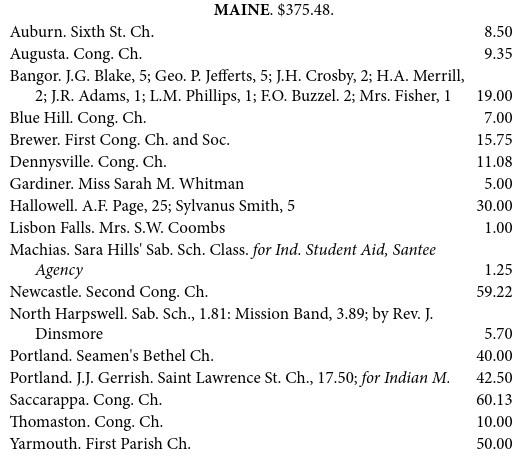
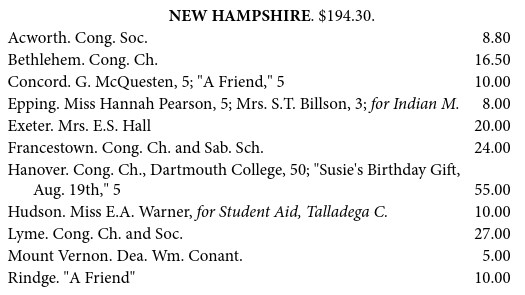
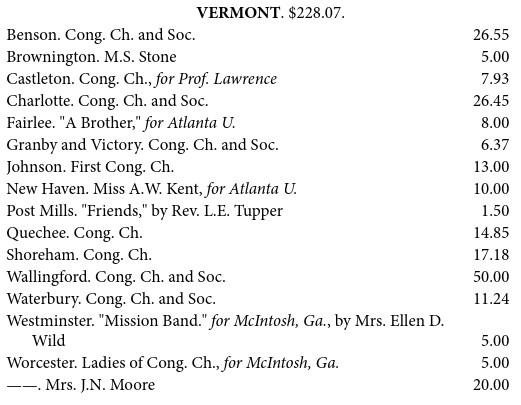
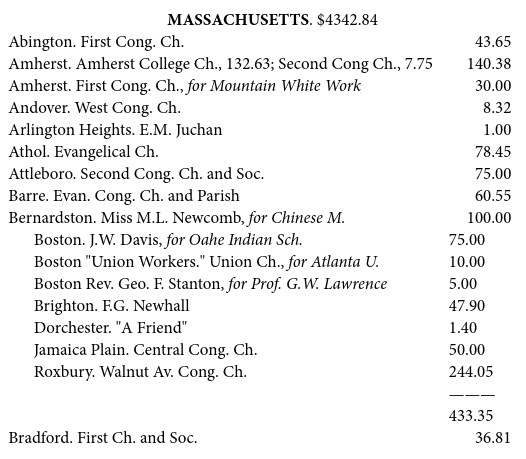

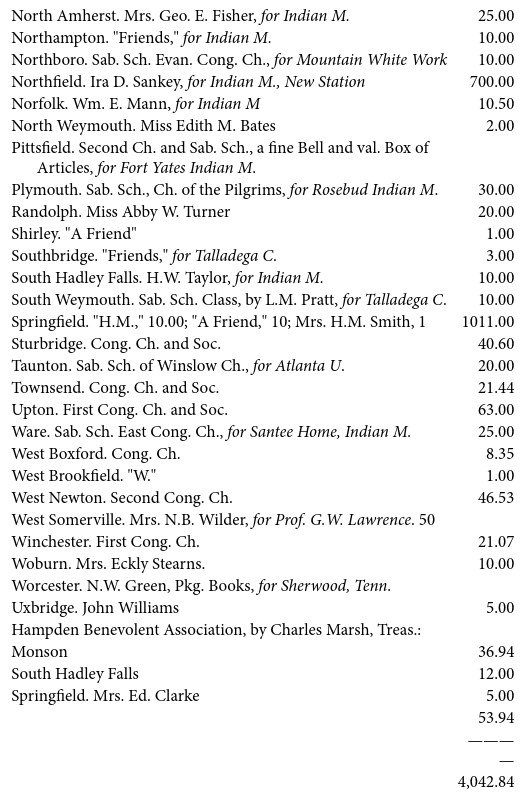
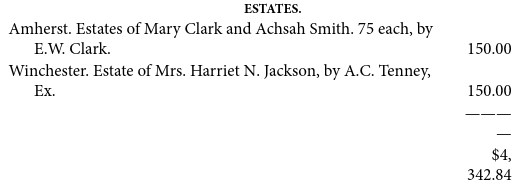


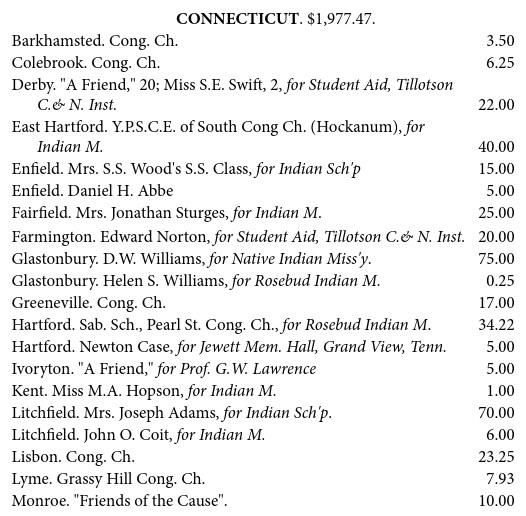
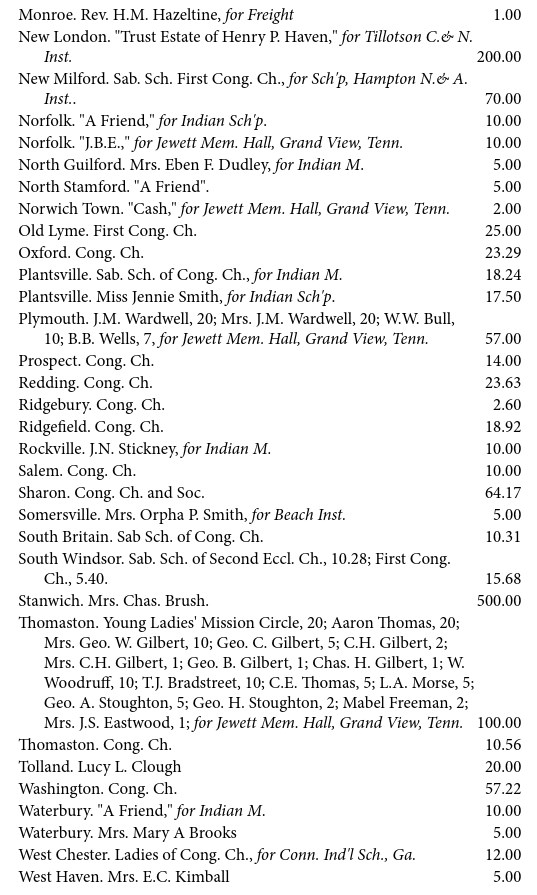
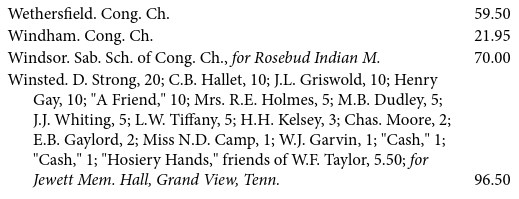
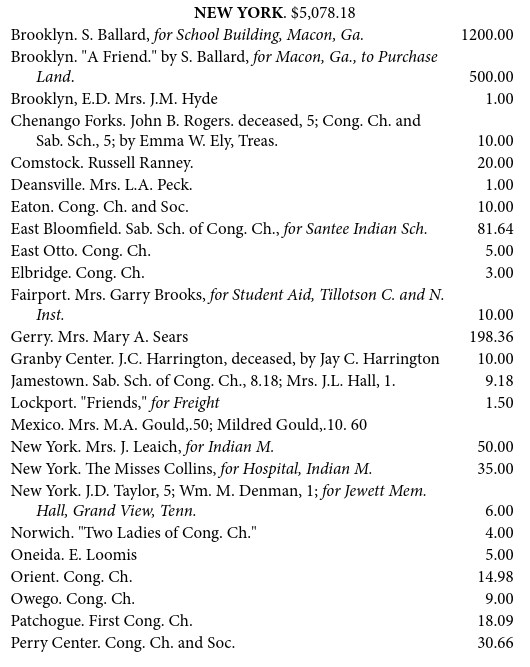
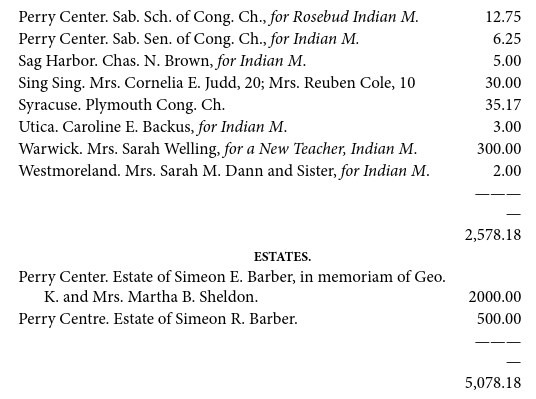


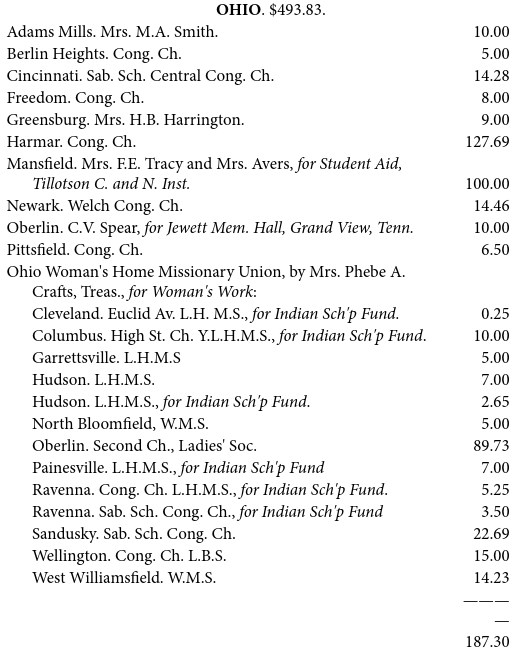
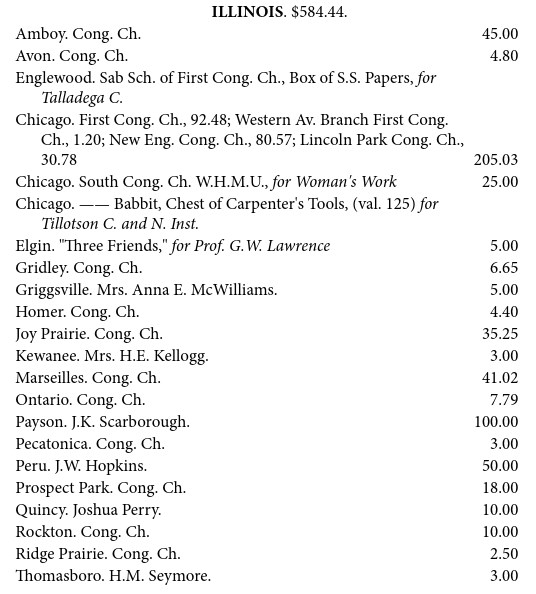
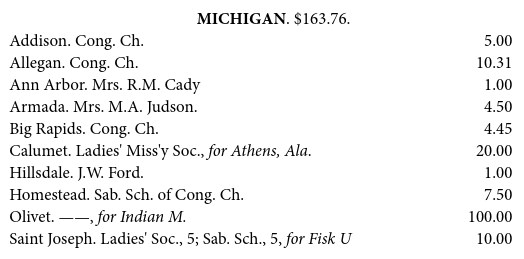
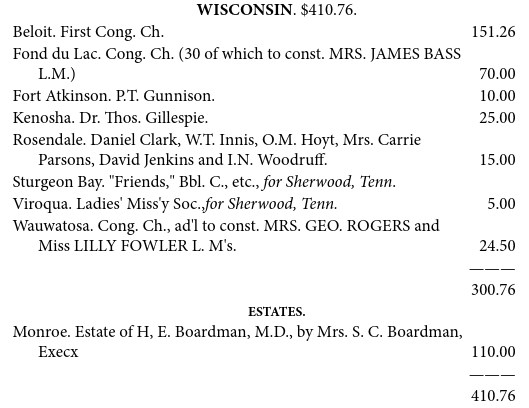
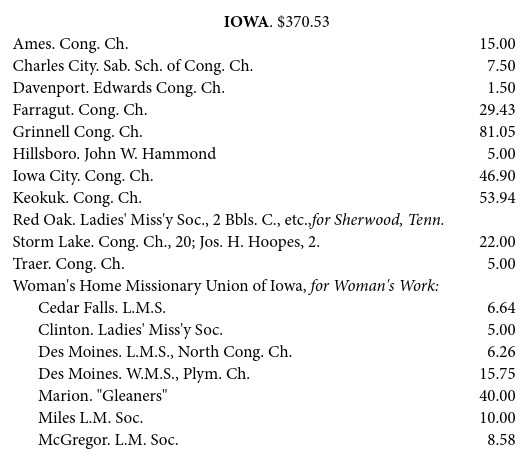

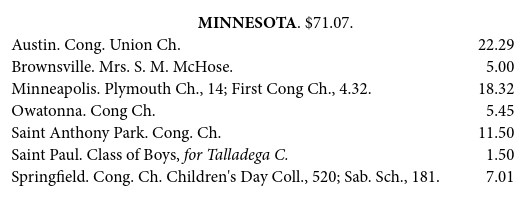













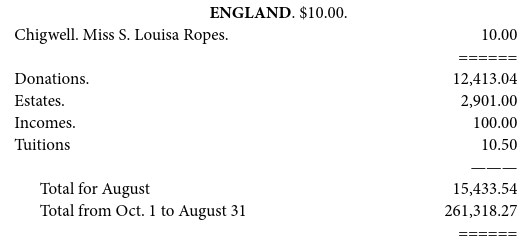

H.W. HUBBARD, Treasurer,









